
EDUC7073 & EDUC7074
Practicum in Guidance, Counselling and Careers I & II
Placement Handbook 2022
2020
2
Contents
Overview ...................................................................................................................................................... 3
Eligibility for Placement ............................................................................................................................... 4
Pre-requisite Course ................................................................................................................................... 4
Co-requisite and Other Courses ................................................................................................................ 4
Blue Card or Exemption Card .................................................................................................................... 5
Registration in InPlace ................................................................................................................................ 5
Placement Orientation Session .................................................................................................................. 5
Aims .............................................................................................................................................................. 6
Objectives .................................................................................................................................................... 6
Placements .................................................................................................................................................. 6
Organisation of Placements ....................................................................................................................... 7
Policies and Procedures ............................................................................................................................. 7
Notification of Placements .......................................................................................................................... 7
Student’s Responsibilities ........................................................................................................................... 8
Placement Supervisor Responsibilities ...................................................................................................... 9
Practicum Supervision .............................................................................................................................. 9
Course Coordinator Responsibilities .......................................................................................................... 9
Placement Progress and Evaluation .......................................................................................................... 9
Ethics and Conduct ................................................................................................................................... 9
APPENDIX A: SUPERVISION ARRANGEMENT FORM ........................................................................................ 10
APPENDIX B: RESUME TEMPLATE (maximum 2 pages) ............................................................................... 11
APPENDIX C: DEPARTMENT OF EDUCATION SCHOOL PLACEMENT REQUEST ........................................... 13
APPENDIX D: OTHER SCHOOL/ORGANISATION PLACEMENT REQUEST ..................................................... 14
APPENDIX E: PRACTICUM REFLECTION TASKS ........................................................................................... 15
APPENDIX F: PLACEMENT REVIEW FORM .................................................................................................... 17
APPENDIX G: SUPERVISION RATING SCALE ................................................................................................ 20
APPENDIX H: EVALUATION OF PLACEMENT EXPERIENCE .......................................................................... 21

3
Overview
The Placement Handbook contains important information for students, supervisors, and academic staff about
EDUC7073 and EDUC7074 Practicum in Guidance, Counselling and Careers I & II.
Students in EDUC7073 and EDUC7074 are completing the Master of Educational Studies (Guidance, Counselling
& Careers) program at The University of Queensland. The placement or practicum experience is an important
component of this specialisation.
The placement serves a number of purposes:
• It provides an opportunity for students to synthesize and integrate the knowledge and skills gained in prior and
concurrent learning experiences and to apply them across the broad range of guidance and counselling tasks
including counselling sessions and with real clients in field settings, program development and delivery, and
consultation with students, parents, staff and professionals from external agencies.
• It acts as a vehicle for their personal and professional growth and development as guidance and counselling
professionals through interaction with their supervisor and/or fellow students.
• It provides an opportunity for students to develop the knowledge and skills required to become competent and
effective guidance and counselling professionals.
Students speak highly of their placements and consistently find them stimulating and challenging learning
experiences. The School of Education at The University of Queensland appreciates the time and professional
expertise that supervisors share with students.
Course Coordinator:
Dr Elizabeth Edwards
School of Education
The University of Queensland
Brisbane QLD 4072
E: elizabeth.edwards@uq.edu.au
If you have questions related to the practicum activities and expectations, please contact
the Course Coordinator.
Placements Team:
If you have questions related to administration issues (e.g., placement requests, InPlace),
please contact the Placements Team.
4
Eligibility for Placement
To meet the eligibility requirements for placement (i.e., EDUC7073 and EDUC7074) students MUST have:
• met the prerequisite requirements
• hold a current 'Blue Card' or 'Exemption Card'
• comply with the COVID-19 vaccination requirements of the allocated placement facility
• completed registration in InPlace and provided the required documentation
• be available to attend a Placement Orientation Session
PLEASE NOTE:
• Places in EDUC7073 and EDUC7074 are limited i.e., quotas may apply.
• Students may be allocated a mix of placement and practicum experience to meet the course requirements.
Further information can be found under Placements on Page 6.
Pre-requisite Course
The following course is a pre-requisite for placement and students are not able to commence placement unless
they have successfully completed it:
EDUC7008 - Counselling in Professional Contexts: Helping Groups and Individuals
This course develops attitudes and skills that will enable students to use the basic skills of counselling in different
professional contexts. Counselling process models are examined.
Co-requisite and Other Courses
Students may also have completed the following courses or they may be undertaking them concurrently:
EDUC7000 - Dilemmas of Development: Risks of Youth
This course explores the dilemmas facing, and risks for, young people growing up in the 21st century, with
particular focus on the diversity of young people and the recent social, economic, cultural and technological
changes affecting the lives of Australia's young people. Attention is given to biological, cognitive, and
psychological developments and the implications these have for identity formation. Particular issues such as
mental health, sexuality, disability, substance use, employment prospects and the variations in young people’s
experience are addressed and a range of theoretical approaches to adolescent development are discussed.
EDUC7007 - Tasks & Tests: Individual Assessment
This course provides students with an understanding of the psychometric underpinnings of standardized
instruments, opportunities to develop their capacity to effectively evaluate such an instrument, and have had an
opportunity to become familiar with a range of instruments useful in individual assessment.
EDUC7009 - Career Guidance: Counselling for Life Planning
This course is designed to equip students with a theoretical knowledge of career development and the knowledge
and skills required to plan, develop, and implement career guidance and counselling programs across different
educational and work settings.
EDUC7010 - Proactive Interventions in Guidance, Counselling and Careers
This course provides students with a sound understanding of the theoretical and practical basis for designing and
implementing guidance and counselling interventions used in individual, group, and systemic contexts. Students
are provided with instruction and reading in counselling theories and specialised counselling interventions.
Placement Supervisors are encouraged to check which of these courses and/or other elective courses their
student has completed. This information will can help to guide the planning of practicum activities

5
Blue Card or Exemption Card
Students enrolled in EDUC7073 and EDUC7074 are required to obtain a ‘Blue Card’ from the Department of
Justice and Attorney-General in Queensland. This government body requires students enrolled in teacher-
education programs to undergo screening – the Working with Children Check. The Blue Card is proof that a
student has successfully undergone screening. Students registered as a teacher with Queensland College of
Teachers must obtain an Exemption Card.
Information on how to obtain a Blue Card can be obtained from the School of Education office or at the following
link: https://education.uq.edu.au/our-students/blue-card-information
Students will not be permitted to attend a placement until they have a current Blue Card or Exemption Card.
Registration in InPlace
Registration on The University of Queensland’s placement management system InPlace is essential in order to
receive a placement for EDUC7073 or EDUC7074. It gives students with the opportunity to provide important
information for their placement including residential address during placement, their mode of transport and details
of any existing conflicts of interest with any schools or organisations. Students are not permitted to undertake a
placement at a school or organisation where they currently work. Students should disclose any other potential
conflicts of interest to ensure the success of their placement. Individual preferences such as school or
organisation type and location cannot be guaranteed.
Students are required to register for EDUC7073 and EDUC7074 separately, as required and in advance. Details
on how to register with InPlace can be found at the following link: https://education.uq.edu.au/current-
students/professional-experience
Placement Orientation Session
Each semester, the Course Coordinator will hold a Placement Orientation Session during Orientation Week. The
session will contain vital information and students must attend prior to their placement.
The Placement Orientation session includes:
• Information on course requirements for EDUC7073 and EDUC7074
• Training on use of the e-portfolio
• Information on ‘What to expect when you’re on placement’
• Interaction with a range of relevant stakeholders e.g., course coordinator, other students in the course, students who
been on placement before, potential supervisors, academic staff, representative from the Placements Team
6
Aims
The aims of EDUC7073 and EDUC7074 are to:
• Provide students with opportunities to implement professional knowledge and skills in a field setting;
• Develop students' competencies required to perform tasks related to the professional role of guidance and
counselling specialists;
• Develop students' ability to perform a professional guidance and counselling role in a field setting.
Objectives
After successfully completing the course(s) students should be able to:
1. Understand the role of a guidance and counselling professional
2. Demonstrate the specialised skills of a guidance and counselling professional including counselling,
consultancy, group work, and program development and delivery
3. Demonstrate the specialised interpersonal skills that enable effective communication and teamwork with a
range of individuals within and beyond the work setting e.g., students, parents, other professionals
4. Demonstrate ethical practice and professional conduct in guidance and counselling work
5. Articulate a personal practice framework
Placements
Generally, placements will be 1 or 2 days per week, however this can vary. It is expected that students will
complete 50 hours of practicum experiences in each course EDUC7073 and EDUC7074, engaging in a range of
guidance and counselling related experiences such as group guidance activities, facilitation of group programs,
class talks, work observation and day to day guidance tasks. Students pursuing a career as a School Guidance
Officer/Counsellor in Queensland should undertake both courses, as such will complete 100 hours of practicum
experiences across one year.
Placements are supervised by, and under the control of, a suitably qualified Placement Supervisor. Placement
Supervisors are often a Guidance Officer or Guidance Counsellor but can also be a Counsellor, Careers
Counsellor, Psychologist, Social Worker, Mental Health Nurse, Youth Support Worker, and other approved
professional. Placements are also overseen by the Course Coordinator.
There is naturally a degree of flexibility associated with placements and activities. Practicum experiences can be
completed in one or more placements. Placement Supervisors are encouraged to negotiate practicum
arrangements with students that are mutually suitable.
For example, a Guidance Officer may agree to supervise a student on placement for 1 day each week for 10
weeks; school days are usually 5-6 hours thus the student will complete the total 50 hours in one placement. In
another example, a Guidance Officer may prefer to supervise a student on a placement for 1 day a week for 6
weeks (30 hours) while the student might also do a second placement within a community organisation for a 1-
week block (20 hours), to meet their 50 hour requirement. Students may also undertake practicum experience
such as reflections on hypothetical practice scenarios and related professional development. During the COVID-19
pandemic, many placement providers are hesitant to take student-counsellors, as such a mix of placement and
practicum experience might be necessary to meet the course requirements (50 hours).

7
Organisation of Placements
Placements in Guidance Counselling and Careers at The University of Queensland are organised by the
Placements Team in the School of Education. Placements are largely determined by suitability for provision of a
range of practicum experiences related to guidance counselling and careers. Each year the university are
appreciative of placements provided by Department of Education schools, Catholic Education schools,
independent schools and a range of community organisations providing counselling and case management
services for children, adolescent and families. Students must not contact schools directly.
Should you require a placement outside of Southeast Queensland, you can request a rural/remote placement.
Placements cannot be taken outside Australia.
Policies and Procedures
The School of Education is committed to providing equitable, quality professional experience placements for its
Guidance, Counselling and Careers students. It is a requirement of any course with a professional experience
component that students sign and lodge a statement that they have read the university’s Policies and Procedure
for Professional Experience Placements document. It can be found here: https://education.uq.edu.au/current-
students/professional-experience This document should be read in conjunction with The University of
Queensland’s policy: https://ppl.app.uq.edu.au/content/3.10.04-work-integrated-learning-and-work-experience
Notification of Placements
The Placements Team endeavor to notify students of their placement details approximately 2 weeks prior to the
commencement of placement. However, in some circumstances, this timeframe can vary. Students will be notified
via their student email and will be required to log in to InPlace to view information. Once students have been
notified of their placement they are required to make contact (by email) with the Placement Supervisor listed and
introduce themselves and organise arrival.

8
Student’s Responsibilities
Students are reminded that while on placement they are representing The University of Queensland. Students
must familiarise themselves with the university’s policy and insurance cover.
The University of Queensland’s Policy on Student Placement Courses
https://ppl.app.uq.edu.au/content/3.10.04-placements-coursework-programs
Insurance cover for students undertaking course placements and work experience
https://my.uq.edu.au/information-and-services/manage-my-program/financial-matters/university-insurance
Students are required to complete assessments for EDUC7073 and EDUC7074 in an e-portfolio.
It is the responsibility of the student to:
• Comply with the COVID-19 vaccination requirements of the placement facility
• Attend a Placement Orientation Session
• Conduct themselves professionally, within their expected scope of practice, in accordance with any legal
and/or policy requirements of the Host Organisation, including completion of any mandatory training; and
• Comply with relevant policies and procedures of The University of Queensland, including the Student Charter,
and external regulatory requirements (including visa requirements).
• Ensure they are adequately prepared i.e., attend a Placement Orientation Session, revise any relevant
coursework, undertake required reading
• Ensure a signed Supervision Arrangement form is returned to the Placements Team, see Appendix A.
• Ensure s/he receives an induction orientating him/her to the workplace, including occupational health and
safety, confidentiality and other workplace policies
• Ensure all necessary signed letters of approval and/or consent are received prior to undertaking any
confidential/restricted activities (i..e, check requirements with the Placement Supervisor)
• Remember that Placement Supervisors are volunteering their professional support, as such they will attempt
to be as useful as possible by sharing their expertise and providing assistance regarding different aspects of
the role, however, in some situations students may require support beyond the supervision arrangement and
in some circumstances this may be at their own expense.
• Negotiate with their Placement Supervisor the range of activities and experiences they wish to gain while on
placement see Practicum Reflection Tasks (Appendix E).
• Undertake all placement requirements e.g., journal log of placement hours, reflection tasks and projects
o Complete a weekly log of hours/activities,
o Complete reflection tasks, see Appendix E
o Complete a written project
• Approximately half-way through the placement or sooner if there are urgent issues to discuss, email the
Course Coordinator to arrange a suitable time to check-in via telephone or online meeting. This check-in
meeting is to discuss how things are going on placement. Complete a Supervision Rating Scale and email to
the Course Coordinator with the meeting details, see Appendix G.
• Access his/her UQ email regularly so that s/he receives information from the Course Coordinator in a timely
manner
• Complete an Evaluation of Placement Experience at the end of the practicum, see Appendix H

9
Placement Supervisor Responsibilities
The University of Queensland greatly appreciates the contribution of the Placement Supervisors. They are highly
valued for their willingness to share their expertise and knowledge with students. Supervisors are required to
undertake the following duties/tasks:
• Conduct an induction process for the student (Including occupational health and safety, confidentiality and
other workplace policies) to orient the student to the workplace.
• Use all reasonable endeavours to provide the student a meaningful and appropriate learning experience.
• Provide supervision, as required. This can be formal or informal, comprising regular check-ins to monitor the
student’s progress and provide suitable debriefs as needed.
• Verify student’s placement hours. This will be a weekly email to endorse the number of hours the student
attended placement. Instructions will be provided.
• Complete a Placement Review, see Appendix F. The review would usually be completed towards the end of
placement. The format of the review comprises an opportunity for the student to self-evaluate using the review
form followed by a 1:1 meeting with the supervisor to received feedback on student’s progress. Instructions
are in the e-portfolio.
Practicum Supervision
Placement Supervisors and Students find it useful to refer to the Queensland Guidance and Counselling
Association Supervision Practice Guide. If you are a member of QGCA you may download this document from the
Members section of the website, www.qgca.org.au and share it with your supervisor/student as necessary.
Course Coordinator Responsibilities
The Course Coordinator is a full-time academic from The University of Queensland. As the academic responsible
for overseeing placements the Course Coordinator will:
• Check-in with the student via telephone or online meeting during the placement and discuss how the student
is progressing
• Check-in with Placement Supervisor via telephone, online or face-to-face during placement and discuss
student’s progress
• Assist with resolving any difficulties regarding placement, student, supervision
• Mark all assessments for EDUC7073 and EDUC7074 i.e., reflection tasks and projects, see e-portfolio
Placement Progress and Evaluation
Should a student or Placement Supervisor have a concern regarding progress on placement, they should contact
the Course Coordinator immediately on: +61 481 906968
Ethics and Conduct
Students are expected to have read the Queensland Guidance and Counselling Association Code of Ethics prior
to beginning their placement. Details can be found at the following link:
https://qgca.org.au/aboutqgca/code-of-ethics/
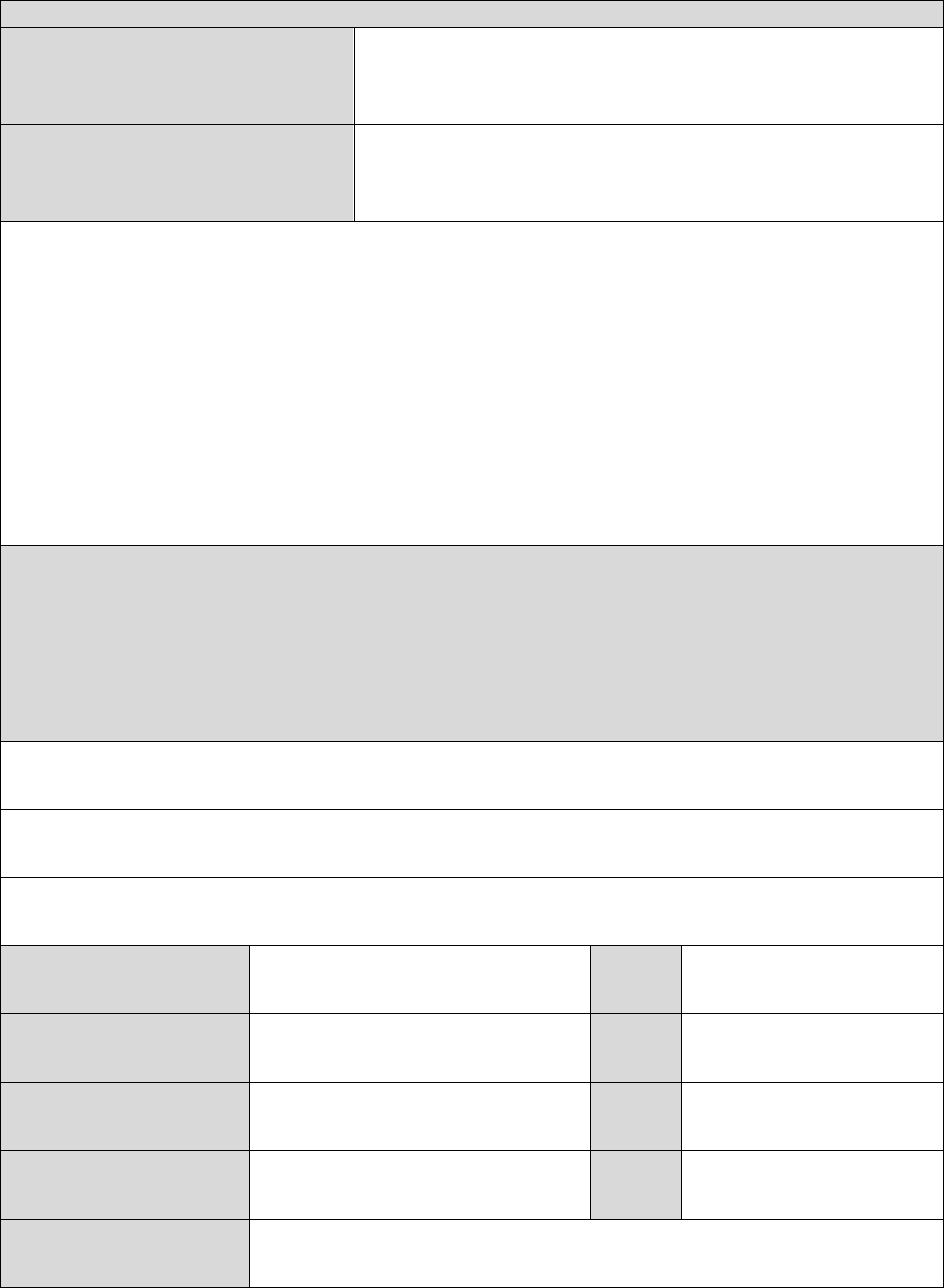
10
APPENDIX A: SUPERVISION ARRANGEMENT FORM
SUPERVISION ARRANGEMENT
NAME OF SCHOOL OR ORGANISATION:
ADDRESS OF SCHOOL OR ORGANISATION:
EDUC7073 and EDUC7074 are practicum courses in the Master of Education Studies (Guidance, Counselling & Careers).
The placements are designed to enable students to gain skills, knowledge and experience relevant to guidance and
counselling work through a range of practicum experiences in settings such as schools and community agencies.
In undertaking the role of Placement Supervisor/Student, you confirm that you have read and understood the details
provided in the Placement Handbook and agree to follow the outlined principles and procedures.
You have also understood that the student must receive notification of approval of his/her practicum placement from The
University of Queensland prior to undertaking any practicum placement. All practicum hours should also be entered into
the e-portfolio journal log by the student and sent to the Placement Supervisor for approval (i.e., electronically, via email).
If you have questions related to the practicum activities and expectations, feel free to contact the Course Coordinator.
E: elizabeth.edwards@uq.edu.au
If you have questions related to administration issues (e.g., placement agreements) please contact the Placements Team.
E: prac@uq.edu.au
PRACTICUM COMMENCEMENT DATE:
PRACTICUM COMPLETION DATE:
TOTAL NUMBER OF INTENDED PRACTICUM HOURS:
STUDENT’S NAME:
EMAIL:
STUDENT’S SIGNATURE:
PHONE:
SUPERVISOR’S NAME:
EMAIL:
SUPERVISOR’S SIGNATURE:
PHONE:
DATE OF SIGNING:

11
APPENDIX B: RESUME TEMPLATE (maximum 2 pages)
Lachlan Sample
Interest
(write a paragraph to describe why you are interested in doing a placement and what you hope to gain from the
practicum experience – maximum 100 words)
Qualifications
The University of Queensland January 2019 – Current
Master of Educational Studies (Guidance, Counselling & Careers)
Courses completed:
• EDUC7008 - Counselling in Professional Contexts: Helping Groups and Individuals
• EDUC7010 - Proactive Interventions in Guidance, Counselling and Careers
• EDUC7007 - Tasks & Tests: Individual Assessment
• EDUCXXXX
• EDUCXXXX
James Cook University January 2008 – December 2011
Bachelor of Education (Early Childhood Studies)
Memberships and Awards
Career Industry Council of Australia Current
Professional Member (Member# 1234)
Australian Counselling Association Current
Student Member
James Cook University 2010
Dean’s List for Academic Excellence
Employment History
Rockingham State School January 2019 – Current
Special Education Teacher
Working Holiday – United Kingdom January 2016 – December 2018
Casual relief teaching
Kindness State School January 2012 – December 2015
Year 6 Teacher
Centrelink July 2006 – December 2007
Customer Service Officer
12
Volunteer Experience
Lifeline Broadbeach May 2019 – Current
Telephone Counsellor
• Completed 6 months training program (Nov 2019)
• Fortnightly telephone counselling shifts
• Provision of practical crisis support
Paradise Kids Arundel June 2019 – February 2020
Paradise Kids Buddy
• Completed volunteer training (Sep 2019)
• Provision of individual support for children participating in grief and loss groups
Referees
Susie Jones
Principal
Rockingham State School
+61 1234 5678
Lionel Long
Lifeline Shift Supervisor
Lifeline Broadbeach
02 1234 5678

13
APPENDIX C: DEPARTMENT OF EDUCATION SCHOOL PLACEMENT REQUEST
(students must have QCT registration)
Request for Consideration of Guidance Practicum
Please note - guidance work is busy, complex & often confidential. Many guidance practices (e.g. testing) are
restricted. Guidance Officers are not resourced to support practicum placements. Therefore, practicum experience
with any one guidance officer will be limited.
STUDENT DETAILS
Date
Click or tap to enter a date
Name of Student
Click here to enter student’s name
Address
Click here to enter student’s address
Student’s phone
number
Student’s email
address
QCT registration
number
Click here to enter registration number
University/Institution
The University of Queensland
Name of Course
Masters of Educational Studies – Guidance, Counselling & Careers
Course Coordinator
Dr Elizabeth (Liz) Edwards
Course Coordinator’s
Contact Details
Phone: 0481 906968
Email: elizabeth.edw[email protected]
UQ Placement Team
Contact Details
DETAILS OF REQUEST
Dates being
considered
Number of hours
being considered
Geographical Area or
Schools
Click here to enter details of geographical area or schools being considered
Any restrictions to
practicum (e.g. travel,
family, disability
needs etc.)
Regional Office use only
Name of SGO
Click here to enter SGO name
Date
Click here to enter date
Action taken
Click here to enter information about action taken
Notes
Click here to include any additonal notes
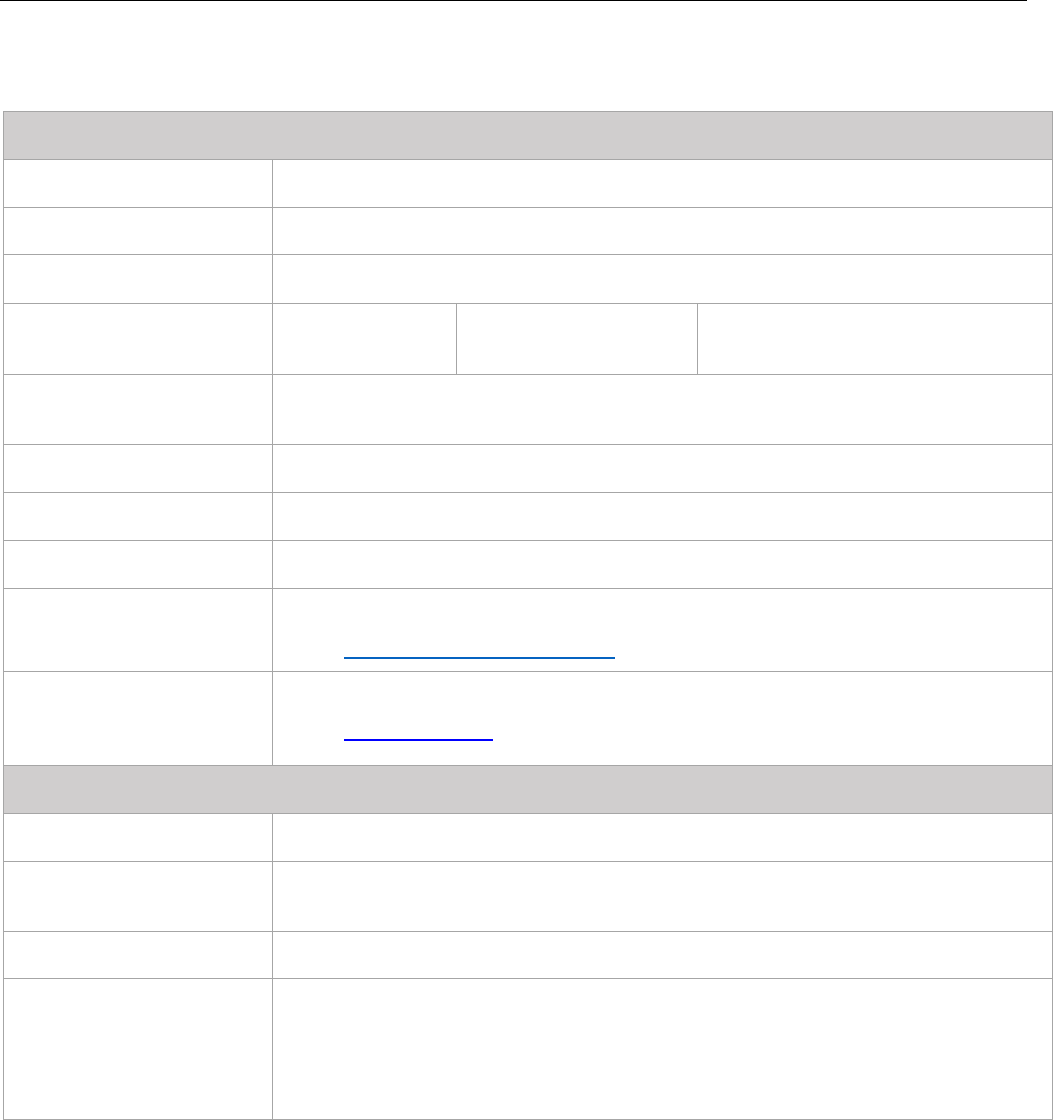
14
APPENDIX D: OTHER SCHOOL/ORGANISATION PLACEMENT REQUEST
Request for Consideration of Guidance/Counselling Practicum
Please note – Use this form if you are requesting a placement in a school or organisation OTHER THAN a
Queensland State School. You should provide a list of as many options as possible to assist us with finding a
placement that suits you.
STUDENT DETAILS
Date
Click or tap to enter a date
Name of Student
Click here to enter student’s name
Address
Click here to enter student’s address
Student’s phone number
Student’s email
address
QCT registration number
(if applicable)
Click here to enter registration number
University/Institution
University of Queensland
Name of Course
Masters of Educational Studies – Guidance, Counselling & Careers
Course Coordinator
Dr Elizabeth (Liz) Edwards
Course Coordinator’s
Contact Details
Phone: 0481 906968
Email: elizabeth.edw[email protected]
UQ Placement Team
Contact Details
DETAILS OF REQUEST
Dates being considered
Number of hours being
considered
Geographical Area or
Schools/Organisation
Click here to enter details of geographical area or schools being considered
Any restrictions to
practicum (e.g. travel,
family, disability needs
etc.)

15
APPENDIX E: PRACTICUM REFLECTION TASKS
The following reflection tasks appear in the student’s e-portfolio for EDUC7073 and EDUC7074. Students are
required to develop self-reflective practice as part of their training in guidance, counselling and careers. While on
placement, they are required to complete a minimum of five (5) reflection tasks for each of EDUC7073 and
EDUC7074. Each reflection is related to a different practicum activity or experience. Reflections are based on the
SEAL framework: Situation, Effect, Action, Learning. This list can be used for planning.
Mark N/A if the activity is not possible or not relevant to the placement setting.
N/A
EARLY PLACEMENT EXPERIENCES/ACTIVITIES
01. Challenges in a new workplace*
02. Interview with a guidance officer/counsellor in your context
03. Observations of a counselling session
04. Observation of a parent interview*
05. Observation of a psychometric assessment
06. Classroom or playground observation
07. Initial intake interview with a young person*
08. Disability/diversity/social justice issue
09. Parent contact*
10. Recordkeeping and/or reporting skills
11. Challenging interpersonal communication
12. Attending a challenging meeting*
MID PLACEMENT EXPERIENCES/ACTIVITIES
13. Research supervision models*
14. Review school-wide programs
15. Ethical issue*
16. Making a referral*
17. Building the therapeutic relationship*
18. Counselling microskills (e.g., empathy, effective listening, paraphrasing, minimal encouragers)
19. Self-assessment of counselling skills and knowledge
20. Career conversation*
21. Subject selection conversation
22. Administration of an assessment (e.g., social emotional, developmental, language, reading,
achievement, cognitive ability).
23. Challenging interaction with a child
24. Challenging interaction with an adolescent*
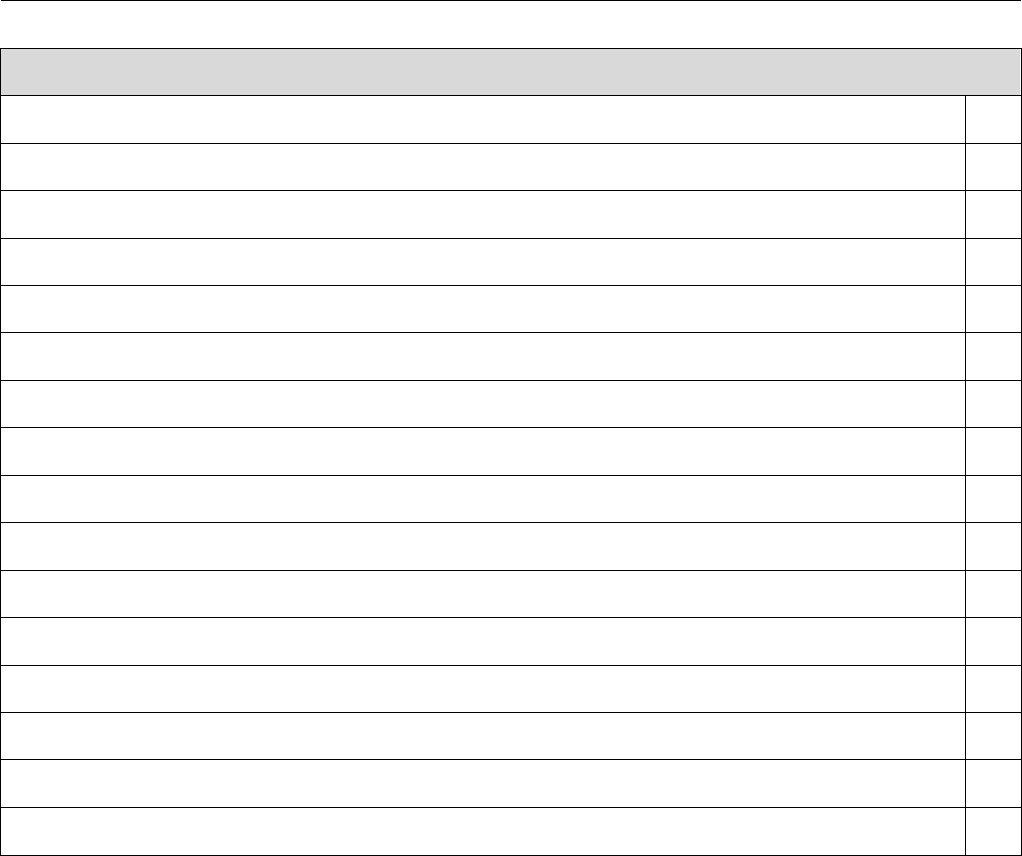
16
LATE PLACEMENT EXPERIENCE/ACTIVITIES
25. The supervisor-supervisee relationship
26. Self-awareness and self-care*
27. Counselling skills/techniques
28. SET plan creation
29. Staff and student/client relationships
30. Legal issue
31. Group versus individual supervision
32. Functional behaviour analysis (FBA)
33. Planning, facilitating/co-facilitating a group intervention/session
34. Conducting/preparing a case study
35. Making a case presentation
36. Parents/carers issue
37. HEADSS Assessment
38. Complex case analysis
39. Monitoring progress in counselling (minimum of 3 sessions)
40. End of placement reflection
* Hypothetical Practice Reflection Scenarios available on Blackboard
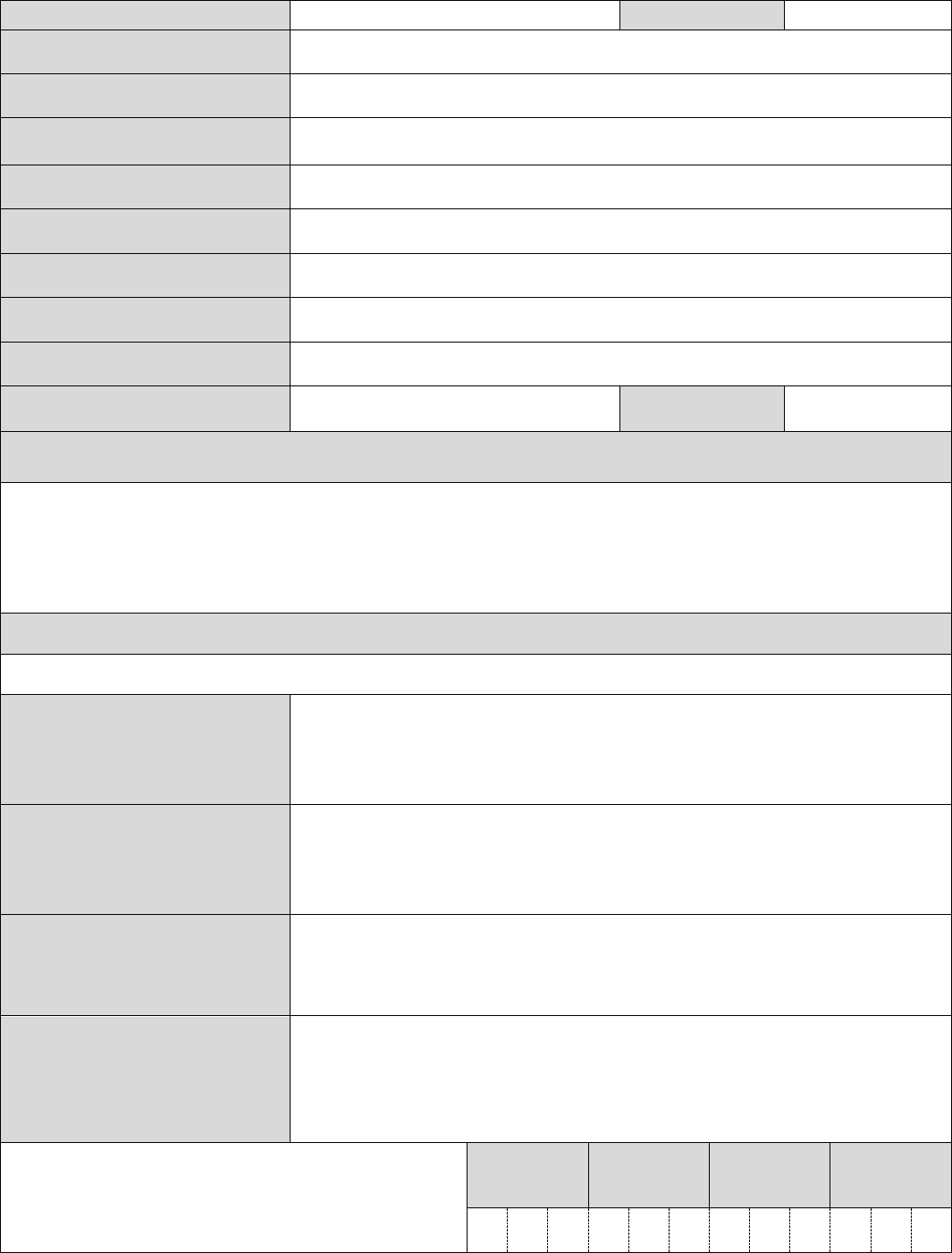
17
APPENDIX F: PLACEMENT REVIEW FORM
COURSE COORDINATOR
Dr Elizabeth Edwards
DATE OF REVIEW
STUDENT’S NAME
STUDENT’S EMAIL
PROGRAM
MEdStudies (Guidance, Counselling & Careers)
SEMESTER
COURSE CODE
EDUC7073 or EDUC7074
SUPERVISOR’S NAME
SUPERVISOR’S EMAIL
PLACEMENT (SCHOOL OR AGENCY)
PLACEMENT DATES
HOURS TO DATE
REVIEW
Section A is used to rate the student’s competencies using a modified version of the Skill Development Rating Scale (SDRS).
Competencies are divided into six (6) domains and rated using a developmental approach from Stage 1 (Beginner) to Stage 4
(Competent). Ratings reflect judgments that best matches the student’s current performance. If uncertain or not observed, tick
N/A (not applicable). Additional comments are optional.
Section B is used to grade the student’s overall progress.
SECTION A
The following descriptors are used to grade student’s clinical competencies in Section A.
STAGE 1- BEGINNER
Knowledge, skills, attitude-value and relationship competencies are yet to be developed
or at an early stage of development, and are on par with students commencing training
without any practicum experience. Frequent minor or major inadequacies may be
apparent, including difficulty applying knowledge to practice, difficulty managing
sessions or conducting specific tasks, or little awareness of process issues.
STAGE 2- BASIC COMPETENCE
Knowledge, skills, attitude-value and relationship competencies are developing and
while more basic competencies are demonstrated under some circumstances, they may
be inconsistent or not generalised. More complex competencies may be absent. Minor
inadequacies occur frequently and major problems may occur occasionally, although
insufficient to cause serious harm.
STAGE 3- MODERATE COMPETENCE
The student demonstrates a moderate repertoire of basic knowledge, skills, attitude-
value and relationship competencies which are generalised to a wide range of common
contexts, with more complex competencies emerging. There is a growing independence
and responsibility for their own practice, with only minor lapses occurring.
STAGE 4- COMPETENT
The student demonstrates a wide repertoire of basic to advanced knowledge, skills,
attitude-value and relationships competencies applied across a wide range of contexts.
Performance is consistent with competencies of student graduating with a Master level
degree in Guidance, Counselling and Careers. There is an appropriate level of
independence and development of adequate professional identity.
Rate the student’s competencies by placing an X along the
scale as shown or tick N/A if not applicable or not observed
in this placement.
Stage 1
Stage 2
Stage 3
Stage 4
X
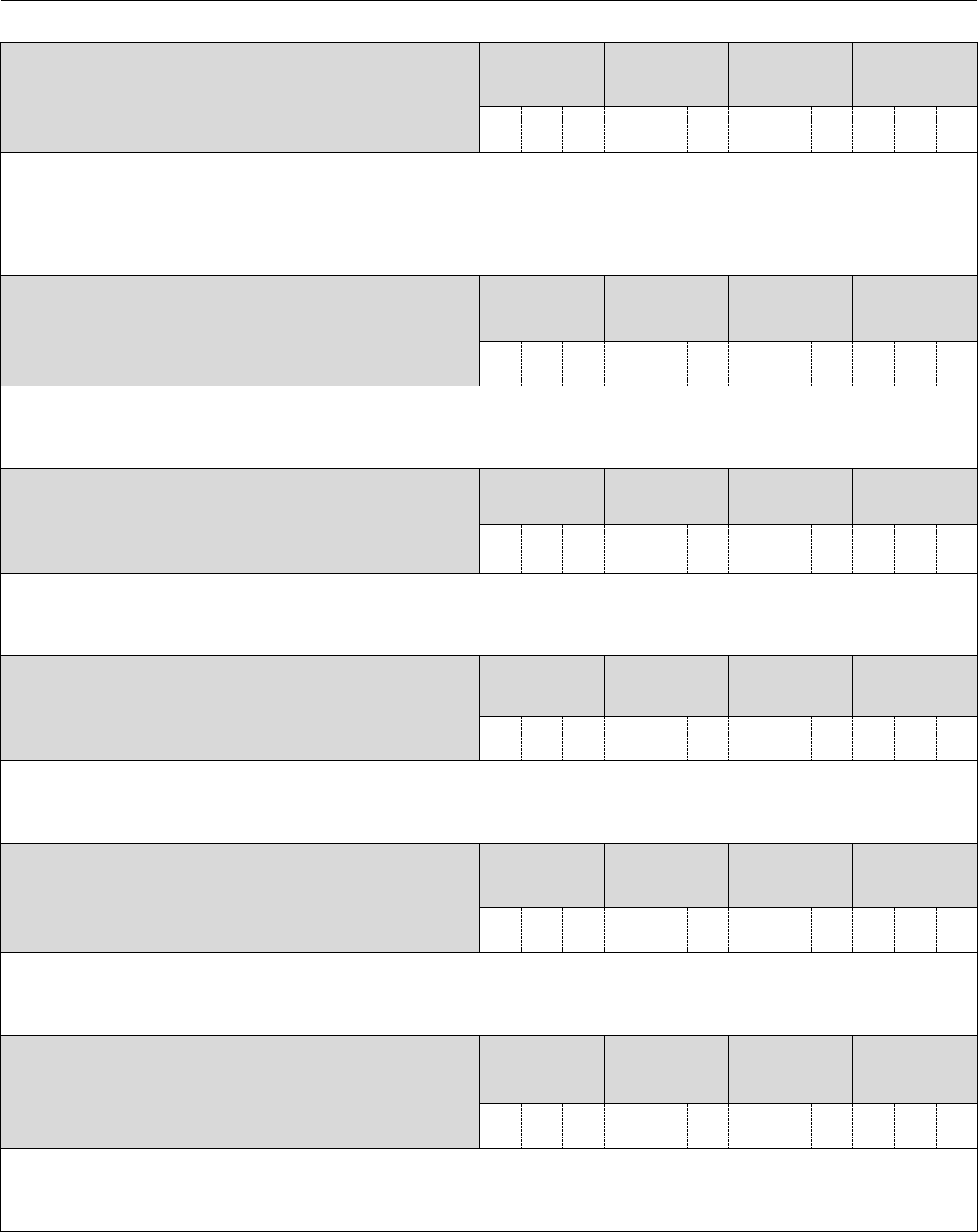
18
1. Counselling and interpersonal competencies
Demonstrates appropriate counselling/communication skills,
empathy and capacity to develop productive relationships.
Stage 1
Stage 2
Stage 3
Stage 4
Comments- □ N/A
2. Assessment and observation competencies
Performs adequate assessments and observations in a timely
and sensitive manner, and assesses risk.
Stage 1
Stage 2
Stage 3
Stage 4
Comments- □ N/A
3. Case conceptualisation competencies
Appropriately integrates information from multiple sources
to inform case management, recommendations/referrals.
Stage 1
Stage 2
Stage 3
Stage 4
Comments- □ N/A
4. Ethical attitude and behaviour
Demonstrates knowledge and application of ethical and
professional codes (i.e., QGCA Code of Ethics).
Stage 1
Stage 2
Stage 3
Stage 4
Comments- □ N/A
5. Professionalism and leadership
Demonstrates effective organisation/time management,
professional demeanour and capacity to provide leadership.
Stage 1
Stage 2
Stage 3
Stage 4
Comments- □ N/A
6. Reflection and response to supervision
Demonstrates insight/reflection on own practice, self
corrects, and an openness to and effective use, of feedback.
Stage 1
Stage 2
Stage 3
Stage 4
Comments- □ N/A
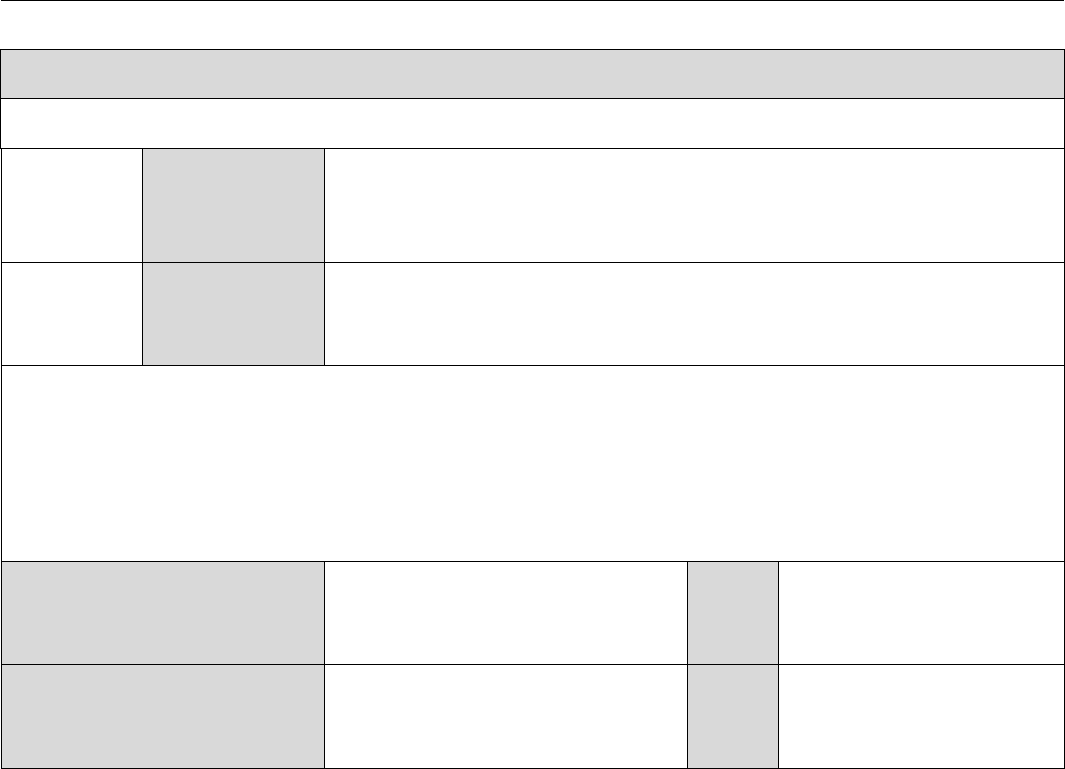
19
SECTION B
Please tick the appropriate box to rate the student’s overall progress.
□
Unsatisfactory
Serious concerns about student’s competencies and/or rate of progress.
□
Satisfactory
Student has demonstrated competencies at or exceeding expected standards at this
stage of training.
Supervisor’s Comments-
SUPERVISOR’S SIGNATURE
DATE
STUDENT’S SIGNATURE
DATE
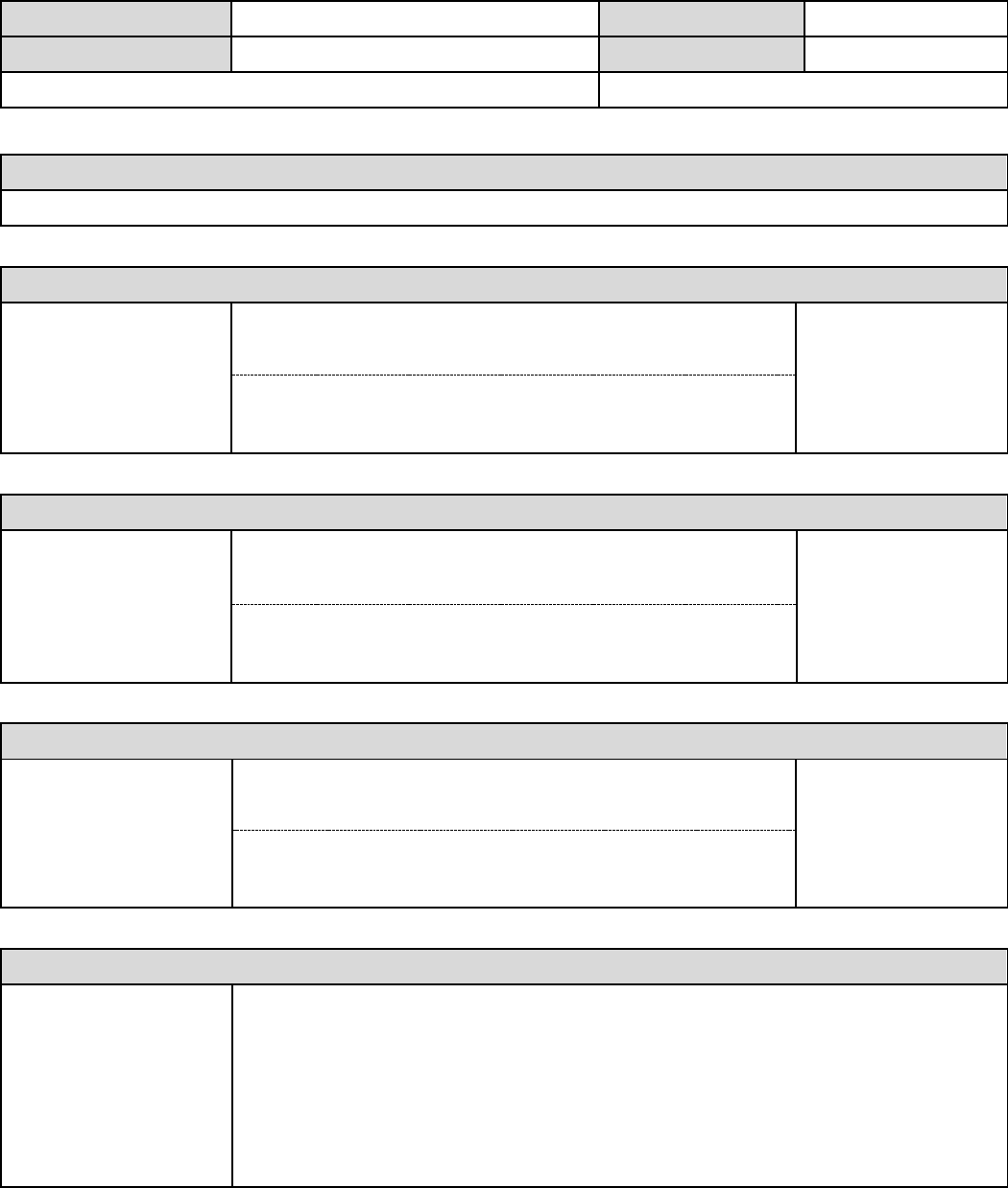
20
APPENDIX G: SUPERVISION RATING SCALE
STUDENT
DATE
i.e., date completed
SUPERVISOR
PLACEMENT
i.e., school
I need my ratings/comments to be confidential
Yes □ No □
INSTRUCTIONS
Place a mark on the dotted lines to indicate how you feel about your supervision sessions.
APPROACH
In general my
supervision sessions
are not focussed
In general my
supervision sessions
are focussed
RELATIONSHIP
In general my
supervisor and I do not
understand each other
in the sessions
In general my
supervisor and I
understand each
other in the sessions
MEETING MY NEEDS
In general supervision
sessions are not helpful
to me
In general supervision
sessions are helpful
to me
COMMENTS
Provide any additional
comments, if necessary
This rating scale is a modified version on the Leeds Alliance in Supervision Scale (LASS; Wainwright, 2010)
Wainwright, N. A. (2010). The development of the Leeds Alliance in Supervision Scale (LASS): A brief sessional
measure of the supervisory alliance. Unpublished Doctoral Thesis. University of Leeds.
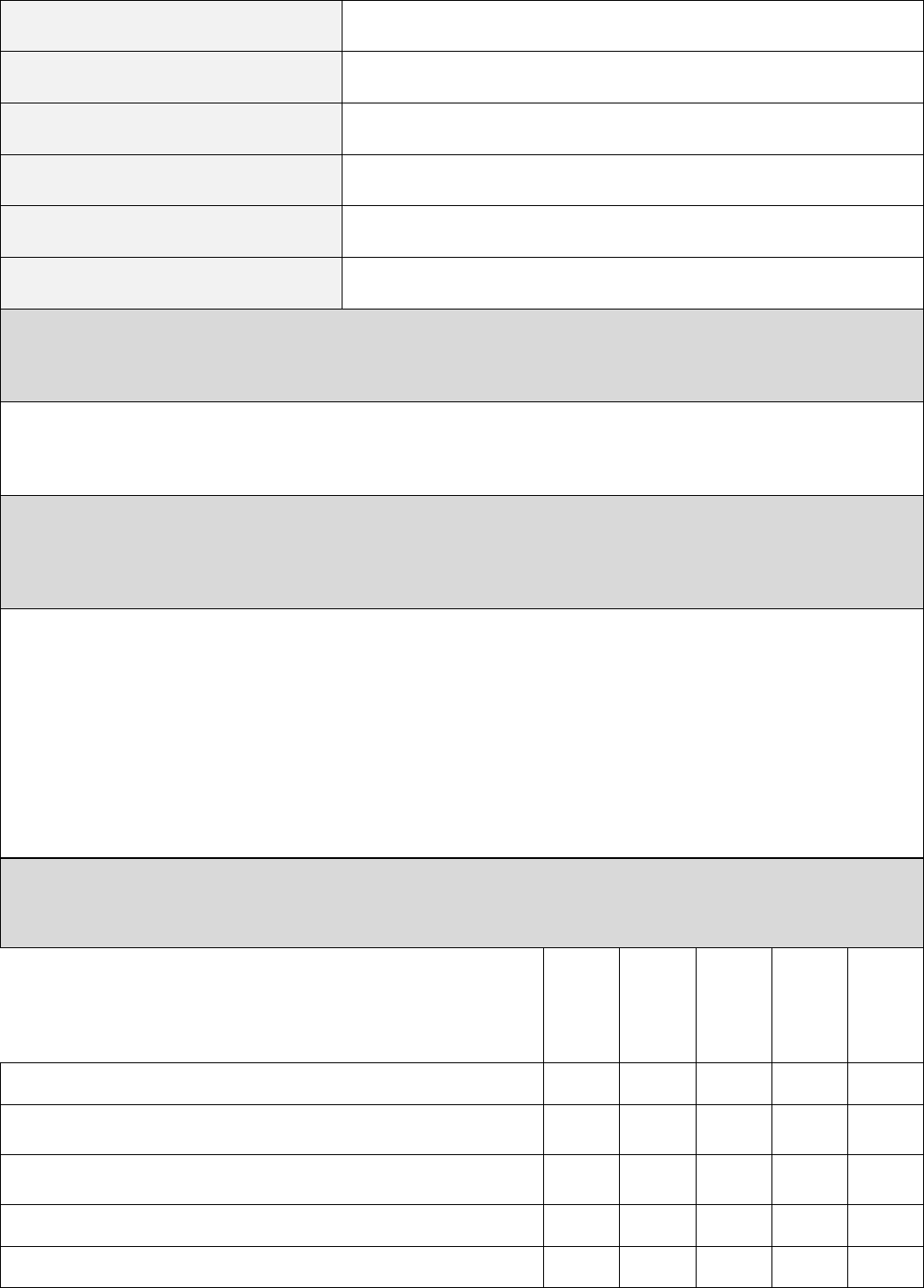
21
APPENDIX H: EVALUATION OF PLACEMENT EXPERIENCE
STUDENT’S NAME
PROGRAMME & COHORT
Master of Education Studies (Guidance, Counselling & Careers)
COURSE CODE
(e.g., EDUC7073, EDUC7074)
LOCATION OF PLACEMENT
PLACEMENT SUPERVISOR
DATES OF PLACEMENT
Start: End:
FEEDBACK ON SUPERVISION ARRANGEMENTS
Provide details of the amount and type of supervision (e.g., number of hours 1:1, paired, group, per week),
location and availability of supervisor.
COMMENTS
Provide a brief description of your activities during the placement (e.g., tasks, assessments, interventions,
evaluations, attendance at meetings etc). Comment on areas of placement and/or supervision that you found
useful or needed improvement.
Students are asked to provide constructive feedback on his or her placement experience, facilities available, and
the overall organisation of the placement. Feedback is intended for use by the Course Coordinator, Placements
Team and (if required) Programme Lead and other relevant staff to optimise the practical aspects of placements.
Poor
Below
Average
Average
Above
Average
Excellent
1. I felt the overall organisation of the placement was
1
2
3
4
5
2. The supervisor clearly specified their expectations of me early
in the placement
1
2
3
4
5
3. I clearly specified my expectations of the supervisor early in
the placement
1
2
3
4
5
4. The resources available to me during the placement were
1
2
3
4
5
5. Overall, the placement was
1
2
3
4
5

